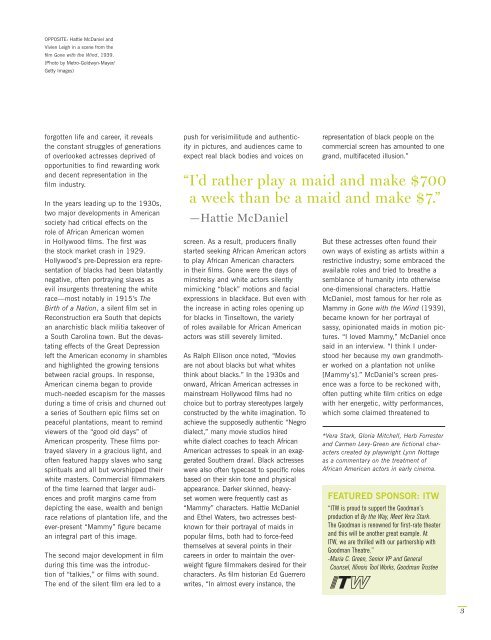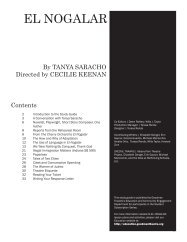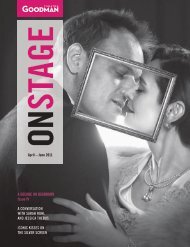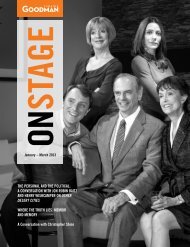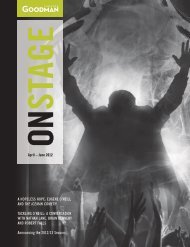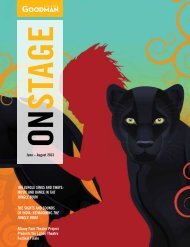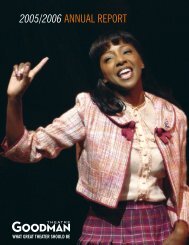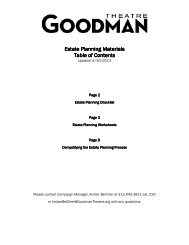BEYOND VERA STARK: HOLLYWOOD'S ... - Goodman Theatre
BEYOND VERA STARK: HOLLYWOOD'S ... - Goodman Theatre
BEYOND VERA STARK: HOLLYWOOD'S ... - Goodman Theatre
Create successful ePaper yourself
Turn your PDF publications into a flip-book with our unique Google optimized e-Paper software.
OPPOSITE: Hattie McDaniel and<br />
Vivien Leigh in a scene from the<br />
film Gone with the Wind, 1939.<br />
(Photo by Metro-Goldwyn-Mayer/<br />
Getty Images)<br />
forgotten life and career, it reveals<br />
the constant struggles of generations<br />
of overlooked actresses deprived of<br />
opportunities to find rewarding work<br />
and decent representation in the<br />
film industry.<br />
In the years leading up to the 1930s,<br />
two major developments in American<br />
society had critical effects on the<br />
role of African American women<br />
in Hollywood films. The first was<br />
the stock market crash in 1929.<br />
Hollywood’s pre-Depression era representation<br />
of blacks had been blatantly<br />
negative, often portraying slaves as<br />
evil insurgents threatening the white<br />
race—most notably in 1915’s The<br />
Birth of a Nation, a silent film set in<br />
Reconstruction era South that depicts<br />
an anarchistic black militia takeover of<br />
a South Carolina town. But the devastating<br />
effects of the Great Depression<br />
left the American economy in shambles<br />
and highlighted the growing tensions<br />
between racial groups. In response,<br />
American cinema began to provide<br />
much-needed escapism for the masses<br />
during a time of crisis and churned out<br />
a series of Southern epic films set on<br />
peaceful plantations, meant to remind<br />
viewers of the “good old days” of<br />
American prosperity. These films portrayed<br />
slavery in a gracious light, and<br />
often featured happy slaves who sang<br />
spirituals and all but worshipped their<br />
white masters. Commercial filmmakers<br />
of the time learned that larger audiences<br />
and profit margins came from<br />
depicting the ease, wealth and benign<br />
race relations of plantation life, and the<br />
ever-present “Mammy” figure became<br />
an integral part of this image.<br />
The second major development in film<br />
during this time was the introduction<br />
of “talkies,” or films with sound.<br />
The end of the silent film era led to a<br />
push for verisimilitude and authenticity<br />
in pictures, and audiences came to<br />
expect real black bodies and voices on<br />
screen. As a result, producers finally<br />
started seeking African American actors<br />
to play African American characters<br />
in their films. Gone were the days of<br />
minstrelsy and white actors silently<br />
mimicking “black” motions and facial<br />
expressions in blackface. But even with<br />
the increase in acting roles opening up<br />
for blacks in Tinseltown, the variety<br />
of roles available for African American<br />
actors was still severely limited.<br />
As Ralph Ellison once noted, “Movies<br />
are not about blacks but what whites<br />
think about blacks.” In the 1930s and<br />
onward, African American actresses in<br />
mainstream Hollywood films had no<br />
choice but to portray stereotypes largely<br />
constructed by the white imagination. To<br />
achieve the supposedly authentic “Negro<br />
dialect,” many movie studios hired<br />
white dialect coaches to teach African<br />
American actresses to speak in an exaggerated<br />
Southern drawl. Black actresses<br />
were also often typecast to specific roles<br />
based on their skin tone and physical<br />
appearance. Darker skinned, heavyset<br />
women were frequently cast as<br />
“Mammy” characters. Hattie McDaniel<br />
and Ethel Waters, two actresses bestknown<br />
for their portrayal of maids in<br />
popular films, both had to force-feed<br />
themselves at several points in their<br />
careers in order to maintain the overweight<br />
figure filmmakers desired for their<br />
characters. As film historian Ed Guerrero<br />
writes, “In almost every instance, the<br />
representation of black people on the<br />
commercial screen has amounted to one<br />
grand, multifaceted illusion.”<br />
“I’d rather play a maid and make $700<br />
a week than be a maid and make $7.”<br />
—Hattie McDaniel<br />
But these actresses often found their<br />
own ways of existing as artists within a<br />
restrictive industry; some embraced the<br />
available roles and tried to breathe a<br />
semblance of humanity into otherwise<br />
one-dimensional characters. Hattie<br />
McDaniel, most famous for her role as<br />
Mammy in Gone with the Wind (1939),<br />
became known for her portrayal of<br />
sassy, opinionated maids in motion pictures.<br />
“I loved Mammy,” McDaniel once<br />
said in an interview. “I think I understood<br />
her because my own grandmother<br />
worked on a plantation not unlike<br />
[Mammy’s].” McDaniel’s screen presence<br />
was a force to be reckoned with,<br />
often putting white film critics on edge<br />
with her energetic, witty performances,<br />
which some claimed threatened to<br />
*Vera Stark, Gloria Mitchell, Herb Forrester<br />
and Carmen Levy-Green are fictional characters<br />
created by playwright Lynn Nottage<br />
as a commentary on the treatment of<br />
African American actors in early cinema.<br />
FEATURED SPONSOR: ITW<br />
“ITW is proud to support the <strong>Goodman</strong>’s<br />
production of By the Way, Meet Vera Stark.<br />
The <strong>Goodman</strong> is renowned for first-rate theater<br />
and this will be another great example. At<br />
ITW, we are thrilled with our partnership with<br />
<strong>Goodman</strong> <strong>Theatre</strong>.”<br />
-Maria C. Green, Senior VP and General<br />
Counsel, Illinois Tool Works, <strong>Goodman</strong> Trustee<br />
3


